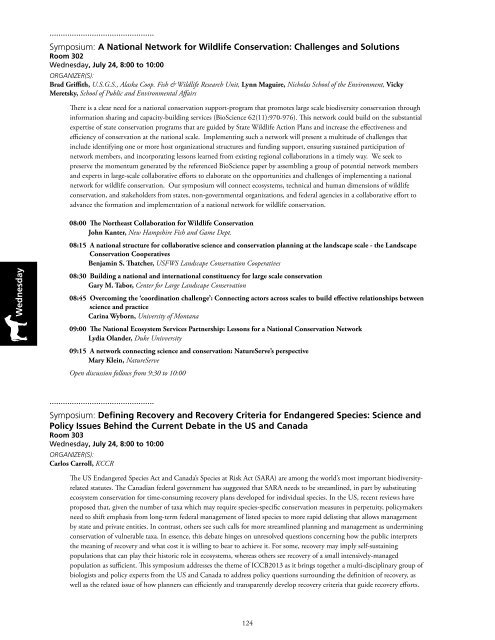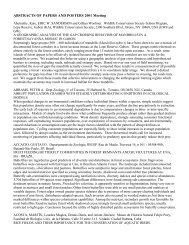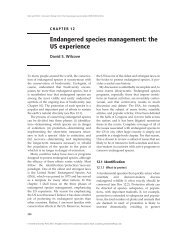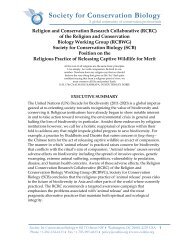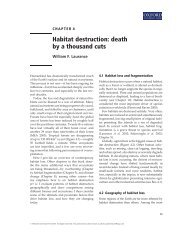ICCB 2013 Program - Society for Conservation Biology
ICCB 2013 Program - Society for Conservation Biology
ICCB 2013 Program - Society for Conservation Biology
You also want an ePaper? Increase the reach of your titles
YUMPU automatically turns print PDFs into web optimized ePapers that Google loves.
...............................................<br />
Symposium: A National Network <strong>for</strong> Wildlife <strong>Conservation</strong>: Challenges and Solutions<br />
Room 302<br />
Wednesday, July 24, 8:00 to 10:00<br />
Organizer(s):<br />
Brad Griffith, U.S.G.S., Alaska Coop. Fish & Wildlife Research Unit, Lynn Maguire, Nicholas School of the Environment, Vicky<br />
Meretsky, School of Public and Environmental Affairs<br />
There is a clear need <strong>for</strong> a national conservation support-program that promotes large scale biodiversity conservation through<br />
in<strong>for</strong>mation sharing and capacity-building services (BioScience 62(11):970-976). This network could build on the substantial<br />
expertise of state conservation programs that are guided by State Wildlife Action Plans and increase the effectiveness and<br />
efficiency of conservation at the national scale. Implementing such a network will present a multitude of challenges that<br />
include identifying one or more host organizational structures and funding support, ensuring sustained participation of<br />
network members, and incorporating lessons learned from existing regional collaborations in a timely way. We seek to<br />
preserve the momentum generated by the referenced BioScience paper by assembling a group of potential network members<br />
and experts in large-scale collaborative ef<strong>for</strong>ts to elaborate on the opportunities and challenges of implementing a national<br />
network <strong>for</strong> wildlife conservation. Our symposium will connect ecosystems, technical and human dimensions of wildlife<br />
conservation, and stakeholders from states, non-governmental organizations, and federal agencies in a collaborative ef<strong>for</strong>t to<br />
advance the <strong>for</strong>mation and implementation of a national network <strong>for</strong> wildlife conservation.<br />
Wednesday<br />
08:00 The Northeast Collaboration <strong>for</strong> Wildlife <strong>Conservation</strong><br />
John Kanter, New Hampshire Fish and Game Dept.<br />
08:15 A national structure <strong>for</strong> collaborative science and conservation planning at the landscape scale - the Landscape<br />
<strong>Conservation</strong> Cooperatives<br />
Benjamin S. Thatcher, USFWS Landscape <strong>Conservation</strong> Cooperatives<br />
08:30 Building a national and international constituency <strong>for</strong> large scale conservation<br />
Gary M. Tabor, Center <strong>for</strong> Large Landscape <strong>Conservation</strong><br />
08:45 Overcoming the ‘coordination challenge’: Connecting actors across scales to build effective relationships between<br />
science and practice<br />
Carina Wyborn, University of Montana<br />
09:00 The National Ecosystem Services Partnership: Lessons <strong>for</strong> a National <strong>Conservation</strong> Network<br />
Lydia Olander, Duke Univversity<br />
09:15 A network connecting science and conservation: NatureServe’s perspective<br />
Mary Klein, NatureServe<br />
Open discussion follows from 9:30 to 10:00<br />
...............................................<br />
Symposium: Defining Recovery and Recovery Criteria <strong>for</strong> Endangered Species: Science and<br />
Policy Issues Behind the Current Debate in the US and Canada<br />
Room 303<br />
Wednesday, July 24, 8:00 to 10:00<br />
Organizer(s):<br />
Carlos Carroll, KCCR<br />
The US Endangered Species Act and Canada’s Species at Risk Act (SARA) are among the world’s most important biodiversityrelated<br />
statutes. The Canadian federal government has suggested that SARA needs to be streamlined, in part by substituting<br />
ecosystem conservation <strong>for</strong> time-consuming recovery plans developed <strong>for</strong> individual species. In the US, recent reviews have<br />
proposed that, given the number of taxa which may require species-specific conservation measures in perpetuity, policymakers<br />
need to shift emphasis from long-term federal management of listed species to more rapid delisting that allows management<br />
by state and private entities. In contrast, others see such calls <strong>for</strong> more streamlined planning and management as undermining<br />
conservation of vulnerable taxa. In essence, this debate hinges on unresolved questions concerning how the public interprets<br />
the meaning of recovery and what cost it is willing to bear to achieve it. For some, recovery may imply self-sustaining<br />
populations that can play their historic role in ecosystems, whereas others see recovery of a small intensively-managed<br />
population as sufficient. This symposium addresses the theme of <strong>ICCB</strong><strong>2013</strong> as it brings together a multi-disciplinary group of<br />
biologists and policy experts from the US and Canada to address policy questions surrounding the definition of recovery, as<br />
well as the related issue of how planners can efficiently and transparently develop recovery criteria that guide recovery ef<strong>for</strong>ts.<br />
124


